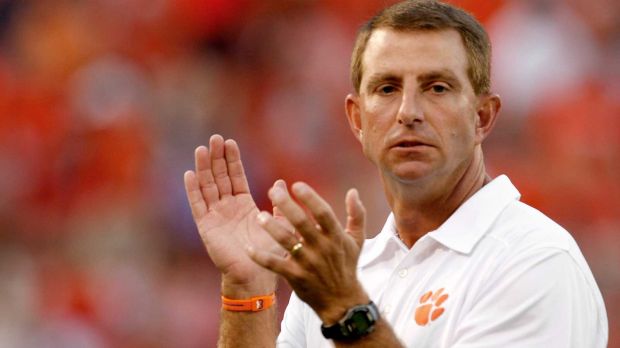You have almost certainly heard the news:
No Facebook. No Twitter. No Instagram. No Snapchat.
Clemson Tigers banned from social media during football season: http://t.co/HMvzC6fw2J
— Sports Illustrated (@SInow) August 15, 2015
In the wake of such a development — which is hardly new, by the way — what emerges is a reinforcement of the belief among several coaches that shutting out the potential for distractions, not just the distractions themselves, is the best way to go through a football season. That makes sense, so it’s hard to be too upset with this kind of decision. There’s a very clear and understandable logical basis for it.
There’s a lamentation which comes on the heels of that acknowledgment, however: For anyone on the Clemson team — or any football player at any program where social media bans exist — the ban sends a specific message: Avoid something if you’re unsure how to handle it. Don’t do this.
Any educator worth his or her keep would tell you that the best method of education lies not in teaching young people to avoid things — to emphasize what one shouldn’t do — but to offer a more constructive path in which young people are taught how to use delicate instruments, whether in the world of mass communication, or chemistry, or political science. If college is a place for teaching, the height and heart of the educational project should lie in the practice of teaching football players how to best use social media, how to take a value-neutral tool and use it for good, not ill. (It’s the same with television — you can watch crap on it, or you can watch wholesome entertainment and/or thoughtful public-affairs programs. The medium is inherently value-neutral; people make it value-negative or value-positive with their consumption habits.)
This, however, is not a new line of thought. Plenty of people (just look at the comments attached to that Sports Illustrated link-tweet above) plunged into a familiar debate about treating adults like children (those opposed to the social media ban) and coaches having the right to exercise control over their programs.
Know something? Both sides are right.
This is not some vile or particularly unpleasant thing Dabo Swinney is doing. Predecessors who have done the same thing should be viewed no differently. The coach-athlete relationship isn’t entirely a parent-child relationship, but the coach does get to run a program as he sees fit, within obvious parameters. (George O’Leary did not honor them at UCF, and so he shouldn’t have a job, even though he does.) Dabo has every right to do this; he’s not stifling free speech. We don’t need an overheated discussion which takes this situation out of proportion.
Want to find a new insight into this issue, or at least, a line of analysis I haven’t seen since this story broke?
It’s not too difficult to find, but it does require taking a step back and considering the way the Clemson program is being operated by its coach.
*
If you were to use one word to describe the way Dabo Swinney is running his Clemson program, what word would that be?
Serious. Good choice — Dabo or any coach who does this means serious business. He’s here to win games, which is quite true. Clemson has a chance to displace Florida State atop the ACC Atlantic and the league as a whole. It’s a big season for the Tigers. Being serious about success is a good thing.
Detailed. Also a good choice. Swinney wants his players focused on the details that matter. This means making other facets of players’ lives less cluttered during the season.
Compartmentalized. This is a very specific term, but it fits. The season is for football and academics, while the offseason can be a time for social-media sharing and interactivity. Dabo wants his players to focus on the now, and expand their spheres of communication only when the season ends. That’s compartmentalization.
Yet, the word which — in many ways — encompasses all three terms above is something which gets to the heart of the matter.
The best word to describe Dabo Swinney’s approach to Clemson football operations is…
professional.
Just stop for a moment and think.
Does that word really seem out of place or inaccurate to any meaningful extent?
Isn’t this how any boss would run an organization? In many office-based workplaces, the rule of the house is that you can’t use the computer on which you perform data entry or other company-related tasks for personal business or entertainment. This setting of boundaries, this establishment of prohibitions, is very much the province and right of the head coach. Dabo is setting rules the players, who signed up to accept his coaching, must abide by as part of being a team devoted to a greater goal: winning the ACC championship in 2015.
Swinney is a highly-paid professional. His job as this highly-paid professional is to win games. Accordingly, he is doing something to get his players to be more focused on football, which will enable them to perform better, which will enable them to win.
Sounds pretty professional to me.
You might not have stopped to consider this at the outset of this piece or when the Clemson story broke, but it’s just one more small (yet very real) example of how college sports are professionalized…
… just without the take-home paychecks for athletes.
